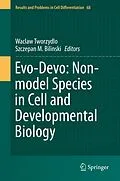Evolutionary developmental biology or evo-devo is a field of biological research that compares the underlying mechanisms of developmental processes in different organisms to infer the ancestral condition of these processes and elucidate how they have evolved. It addresses questions about the developmental bases of evolutionary changes and evolution of developmental processes.
The book's content is divided into three parts, the first of which discusses the theoretical background of evo-devo. The second part highlights new and emerging model organisms in the evo-devo field, while the third and last part explores the evo-devo approach in a broad comparative context. To the best of our knowledge, no other book combines these three evo-devo aspects: theoretical considerations, a comprehensive list of emerging model species, and comparative analyses of developmental processes.
Given its scope, the book will offer readers a new perspective on the naturaldiversity of processes at work in cells and during the development of various animal groups, and expand the horizons of seasoned and young researchers alike.
Autorentext
Waclaw Tworzydlo received his PhD from the Jagiellonian University in 2006 and is currently Associate Professor in zoology and developmental biology at the Jagiellonian University in Krakow.
Szczepan M. Bilinski received his PhD from the Jagiellonian University in 1975 and is currently Secretary General of the Polish Academy of Arts and Sciences and Professor of zoology, cell and developmental biology at the Jagiellonian University in Krakow.
Inhalt
szczepan.bilinski@uj.edu.pl
Department of Developmenatl Biology and Invertebrate Morphology, Institute of Zoology and Biomedical Research, Jagiellonian University, Krakow, Poland.
2. Evolutionary origins of colonial development in ascidians
Federico D. Brown (co-author: Laurel Hiebert)
fdbrown@usp.br
Department of Zoology, University of Sao Paulo, Brazil
3. Development of the marsupial frogs
Eugenia M. Del Pino
EDELPINO@puce.edu.ec
School of Biological Sciences, Pontificia Universidad Católica del Ecuador,
Quito, Ecuador
4. Cell type evolution - lessons from Trichoplax adhaerens
Micheal Eitel
m.eitel@lmu.de
Department of Earth and Environmental Sciences, Ludwig-Maximilians-University of Munich, Germany
5. Hydra regeneration
Brigitte Galliot
Brigitte.Galliot@unige.ch
Department of Genetics and Evolution, University of Geneva, Geneva, Switzerland
6. Determination of animal-vegetal axes in Gastropoda/Spiralia embryos
Jonathan Henry
j-henry4@illinois.edu
Deptment of Cell and Developmental Biology, University of Illinois, Urbana, USA
7. Chelicerate type of the ovary - implications on the gonad structure and the course of oogenesis
Izabela Jedrzejowska
izabela.jedrzejowska@uwr.edu.pl
Department of Animal Developmental Biology, Institute of Experimental Biology, University of Wroclaw, Poland
8. The diversity of model systems in evolutionary developmental biology
Allan C. Love (co-author: Yoshinari Yoshida)
aclove@umn.edu
Department of Philosophy, Minnesota Center for Philosophy of Science, University of Minnesota, USA
9. Arthropod eye evolution
Victor B. Mayer-Rochow
meyrow@gmail.com
Department of Biology, University of Oulu, Finland
10. Mollusc development
Liliana Milani
liliana.milani@unibo.it
Department of Biological, Geological and Environmental Sciences, University of
Bologna, Bologna, Italy
11. Development of Xenoturbellida
Hiroaki Nakano
h.nakano@shimoda.tsukuba.ac.jp
Shimoda Marine Research Center, University of Tsukuba, Japan
12. Developmental geneti...
